Close, but no Cigar

(via Brandon)
Come here for all of Steven Padnick's deep, deep insights into comics, superheroes, publishing, and everything in between.


(via Brandon)
Posted by
Steven
at
1:48 PM
4
comments
![]()
Labels: Mad Thinker, Meme, Politics
Why is Adam Strange missing from this page? I know they did his origin...
And isn't this the cutest little Steve Wacker ever?
Posted by
Steven
at
3:28 PM
0
comments
![]()
Labels: 52, Adam Strange, DC Comics, Steve Wacker
The DC Comics Infinite Holiday Special is worth picking up, even if they did COMPLETELY blow the pun that made me want to buy it in the first place, for all the reasons Chris mentions, and for the first solo adventure of Kate Kane, the new Batwoman.
The plot is, unfortunately, not very good. Some obtuse silent panels near the end made me re-read the story three times to figure out what was going on, and once I did, I was kind of disappointed with the simple plot.
But as a character study, it's really good short story. We learn lot about Kate as a person, who celebrates holidays quietly with her father and would rather avoid confrontation with her step-mother entirely than make a scene at the big party, who visits an elderly friend with no family, who cares about tradition and family, while not particularly caring about "traditional families", and as Batwoman, has a Frank Miller-esque violence streak that I can't say I disapprove of. (oh, and yes, in fact, she IS Jewish).
Interestingly enough, as the character was first introduced to the general public as "a wealthy, buxom lipstick lesbian", none of those facts really come into play. Her money and her sexual orientation are only alluded to in passing, and her bust size barely affects the plot at all. Heck, even her own religion isn't as important as the religion of her friend, which is a nice way of adding a character wrinkle without making it the POINT of the story.
So, yeah, I'm happy with the results. While I'm not pushing for a Batwoman ongoing just yet, I'd buy a four issue Renee Montoya/Kate Kane miniseries (Rucka, Brubaker and Lark, in a dream world, but I'd accept Rucka and Bennett in the real one).
Here's the pitch: "She's an ex-cop from the barrios of Gotham. (and a lesbian). She's a Jewish socialite by day and high-healed vigilante by night. (and a lesbian). Together, they fight crime. (and beat the ever-loving shit out of James Dobson)".
I'd buy it.
Posted by
Steven
at
11:57 AM
3
comments
![]()
Labels: 52, Batwoman, Christmas, DC Comics, Gender, Greg Rucka, Jewish, Religion, The Question
Incomprehensible. Exclusive. Written for a small, insular community that has a shared history with these characters, full of half-explained references and verbal and visual shorthand.
The latest issue of JSA?
Nope, this blog.
A friend recently told me that my blog is "insane". She couldn't follow a thing I wrote about and, considering that she doesn't read superhero comics, she's completely right.
I mean, look at my last few posts. Even besides the meme panels (new computer at work has PhotoShop, in case you were wondering, and TWO Thor clone jokes? I'm slipping), it's unexplained references to the most obscure characters, inside jokes about shared writing complaints, and a general assumption that my audience not only knows the stories I'm talking about, but has actually read every issue that I've read... which is, well, "insane."
So my New Years blogging resolution is to make my blog more New Reader friendly. More explaination, more annotation and explanatory links. Basically write it for an audience that knows who Superman and Batman are, but maybe not that J'onn J'onzz, the Martian Manhunter, has a fondness for Oreo cookies (or Chocos, as they are known in the DCU).
Erm... the DCU being shorthand for the DC Comics Universe, the shared setting for most of the superhero stories published by DC Comics.
Though some of the Vertigo books actually take place in the DCU as well. And occasionally Wildstorm books.
Vertigo being DC Comics mature line of books...
hm, this may be harder than I thought.
Posted by
Steven
at
1:30 PM
1 comments
![]()
Labels: Writing
Posted by
Steven
at
5:27 PM
1 comments
![]()
Labels: Captain America, Civil War, Clor, Iron Man, Meme, Thor
Posted by
Steven
at
10:57 AM
0
comments
![]()
Labels: DC Comics, Dylan Battles, Manhunter, Meme
 (image courtesy of Kevin)
(image courtesy of Kevin)
Posted by
Steven
at
3:48 PM
2
comments
![]()
Labels: Civil War, Clor, DC Comics, Fatal Five, Meme, Validus
Posted by
Steven
at
4:58 PM
0
comments
![]()
Labels: Brad Meltzer, DC Comics, Garth Ennis, Geoff Johns, Justice Society
If you ain't reading Blockade Boy, you're missing out on the funniest blogger on the internet.
It's all gold, but, in case you missed it, his review of Power Man and Iron Fist #70, or rather, his reviews of the fashions of 1981, first ladies' gowns, then menswear, is fucking hilarious.
Go. Read. Now.
Posted by
Steven
at
5:27 PM
1 comments
![]()
Labels: Blockade Boy, Iron Fist, Power Man
Anyone else think Dr. Mid-Nite should have a theme song and back up singers?
Posted by
Steven
at
7:30 PM
0
comments
![]()
Labels: Dr. Mid-Nite, Polite Dissent, Songs
God dammit, Garth!
The first rule of burger joint is you DO NOT TALK ABOUT BURGER JOINT!
Why couldn't you have said Island Burger on 51st and 9th? Or, I don't know, Peter Lugar's or something. I mean, yeah, if you've set up in the Flatiron building, the Shake Shack really is at your feet, and that was a nice scene, but still... burger joint is crowded enough as it is without having every fanboy in Manhattan jamming the booths hoping to get a glimpse of you or Darick!
And while you're here, there's a few other things I'd like to tell you. First, pick up the GOD DAMNED PACE! I've paid good money for "my favorite heroes getting the crap kicked out of them" and we're only getting to that in issue 6? C'mon! That should have happened back in issue 4, or 3 even. By now the Seven should be already be moving against the Boys, or at least we should have been given a wider view of your world (how many super teams ARE there? and where are the super villains?)
And Lamplighter, your Green Lantern analogue that Homelander implicitly killed, is he really dead or merely crippled, so that he can join the Boys later when they bring down the Seven? And who was the guy A-Train replaced? Was he killed by the Homelander too?
That said, I am, in fact, enjoying the series, which drops just enough humanizing details in along with the obscene and ridiculous to keep me emotionally tethered even while pushing my envelope. But I may just switch to trades, which is, after all, how I read Preacher, so maybe that's what works best for you.
Thanks,
Steven
p.s. The Frenchman. That's Grant Morrison in a pair of goggles and a outrageous accent, isn't it?
Posted by
Steven
at
10:24 AM
3
comments
![]()
Labels: burger joint, DC Comics, Garth Ennis, Grant Morrison, Preacher, The Boys
Dan Didio, re: new Infinite Christmas Special.
"we have the first solo appearance of Batwoman in a Hanukah story as well"
Ruh... really?
On the one hand, as one of the Chosen People, I appreciate the acknowledgment that not everyone celebrates Christmas this time of year. And it's always nice to see other children of Abraham running around kicking ass.
That said, I'm always a little weirded out by the off-handed shout out to the Torah people we get every December for what, in the larger picture, isn't really that important a holiday. "We got a good deal on the oil!" That's basically what it's about. It's only elevated because it happens to fall around the same time as Christmas, and if the Jewish calendar was a little different, you'd all be wishing me a Happy Simchat Torah.
I'd be much happier if, instead of getting 1 out of 8 pages devoted to Kate Kane lighting the menorah, the Infinite Christmas Special was allowed to be just the Infinite Christmas Special (And it has to be the Infinite Christmas Special because the pun wouldn't work otherwise), and instead we got a Passover special come April (and no, this doesn't count).
Heck, they could do a follow up to Day of Vengeance, called "Day of Atonement," where the Spectre goes around apologizing one by one to all the magic users he attacked.
Like My Name is Earl with phenomenal, cosmic power.
Which is a long way of saying, thanks for the shout out, DC, but where's the honey and apples on Rosh Hashanah?
Posted by
Steven
at
4:41 PM
5
comments
![]()
Labels: Batwoman, Christmas, Dan Didio, DC Comics, Jewish, My Name is Earl, Religion, The Spectre
On the surface, Jack Kirby's Fourth World saga is a simple adaptation of Manichean philosophy: there's a world of Good, New Genesis, and a world of Evil, Apokolips, and all of human existence is in the narrow strip where they overlap and conflict.
But the crucial story of the New Gods, what, if this were a "real" mythology, would be the central myth, (and incidentally, one of Jack Kirby's favorite stories of his own,) is "The Pact." The Pact is a very un-Manichean story in which Highfather (Good) makes a deal with Darkseid (Evil) in the name of peace, and seals this deal with the extreme measure of trading sons (which is a step up from just spitting in your palm, I guess).
In any morality as black and white as Manicheanism, such a pact would be doomed to failure (Mr. A would not approve!) because Evil would not honor any such contract, placing Good in the weaker position that they could only get out of by breaking the contract themselves, erasing the difference between Good and Evil. And, indeed, Darkseid intends to subvert the pact from the beginning.
But instead of leading to the downfall of New Genesis, The Pact works out in Highfather's favor! Because, despite Darkseid's plotting, the actual result of the Pact is that the traded sons--Orion, who has the nature of Apokolips and the nurturing of New Genesis, and Scott Free, who has the nature of New Genesis and the... ah, "nurturing" of Apokolips--BOTH end up fighting for the side of Good!
There are a few lessons to be drawn from that. First is that Good is not something that resides solely in one's blood or one's environment, but in both. Secondly, Good is inherently more compelling than Evil. Evil is NOT a force equal and opposite to Good. Evil may, in fact, be the mere absence of Good, a void that can be filled through whichever medium, genes or education, that is available to Good. Third, there are therefore no truly evil people, even beings that supposedly embody Evil. Any being capable of choosing, any being capable of change, has the potential to be Good!
Consider Big Barda. Unlike Scott and Orion, she is Apokolips born and bred. It is therefore neither in her nature nor her nurture to be Good. As a pure creature of Apokolips, there should be no Good in her. And yet...
And yet, by meeting and getting to know Mr. Miracle, the character who perhaps best embodies Kirby's ideas about what Good is, she falls in love with him and the idea of freedom he represents. He inspires her to be better, to treat others with respect, to demand the freedom that he himself refused to ever relinquish, and fight for the freedom of others. (Also take note that their ideal of freedom, their escape from the high fantasy drama of the Fourth World saga, is a mundane suburban existence as husband and wife. Which just goes to show you don't need to be a punk to be a rebel.)
This is a much more nuanced, much more hopeful, meditation on the struggle between Good and Evil than most superhero stories; heck, there's more depth in this story than in a lot of mythology. The idea that even demons can be redeemed, that all that separates a Fury from a Goddess is a light to show the way, shows a more sophisticated system of thought than naming the villain "Dark Side" would imply.
And, perhaps, that is Darkseid's true villainy: that he disguises the world as one of sharp divides, Us and Them, black and white, Good and Evil, in eternal conflict, never-ending battle, where causes are defended not by their inherent value but by the force of arms. It takes a (Mr.) Miracle to show the folly in this ideology, that the New Gods of both sides have more in common with each other than differences, and that the Good can trust the rightness of their cause to appeal through dialogue and contracts.
It suggests that the best way to combat true evil in the world is negotiation, compromise, listening. Because compromising your goals does not compromise the good of your cause, and somehow, in some way, Good will out!
Posted by
Steven
at
4:30 PM
5
comments
![]()
Labels: Big Barda, Darkseid, DC Comics, Highfather, Jack Kirby, Mr. Miracle, New Gods, Orion
... and for learning to solve interpersonal problems the superhero way, indestructible cheerleader Claire Bennett takes the top position as best character on Heroes, knocking heavy favorite Hiro Nakamura into a solid second.
Perennial underdog Peter Petrelli came through with a surprisingly strong showing this week, and don't forget dark horse contender Matt Parkman, who had a by.
However, Mohinder? Has got to go.
Posted by
Steven
at
9:19 AM
3
comments
![]()
Labels: Heroes (tv show)
Bought Final Fantasy XII yesterday.
Going away for a while.
Would appreciate a phone call now and then reminding me to eat.
Posted by
Steven
at
4:28 PM
1 comments
![]()
Labels: Video Games
Word balloon I expect to see before the end of 52:
Posted by
Steven
at
12:48 AM
2
comments
![]()
Labels: 52, DC Comics, The Question
After yesterday's post, I think it important to point out that DC isn't limiting its reader education program to the female anatomy. From the cover of the All-New Atom #8:
Posted by
Steven
at
10:15 AM
3
comments
![]()
Labels: DC Comics, Gail Simone, Gender, Naughty Bits, The Atom
I'm looking forward to meeting you.
I like your influences, both the original and the robotic Red Tornadoes, and from what little I've seen of you, you strike me as a fun character, a cheerful presence that the Justice Society and the DCU in general just doesn't have enough of.
And let me tell, I LOVE your costume. It might just be my thing for redheads, but well, look at you.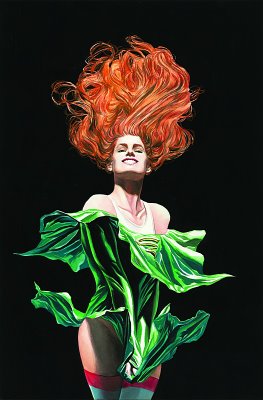
Your hair is shiny and voluminous, your wrap is playing in the wind, and I like the tornado symbol on your chest. You even remembered to smile for your portrait, which is more than I can say for that grump Hawkman.
Though, if I can offer some advice: I know you're super excited about joining one of the big teams and having your own superhero codename ("Cyclone," I like), but please remember to put on some underwear before going out to fight crime.
No reason for Solomon Grundy to get a peak at your secret garden.
(by the way, three makes it a conspiracy, so I have a new tag)
Posted by
Steven
at
2:25 PM
0
comments
![]()
Labels: Cyclone, DC Comics, Gender, Justice Society, Naughty Bits, Red Tornado
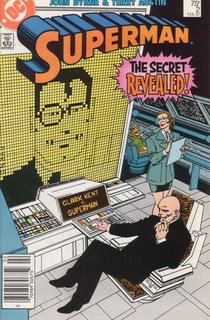 Second hardest character in fiction to write? A protagonist that's smarter than the you are. If someone is a certifiable genius, if, in fact, her super power is being a genius, then how are you ever going to come up with something so clever and wise that it earns the distinction of intelligence beyond the merely human.
Second hardest character in fiction to write? A protagonist that's smarter than the you are. If someone is a certifiable genius, if, in fact, her super power is being a genius, then how are you ever going to come up with something so clever and wise that it earns the distinction of intelligence beyond the merely human.
There's ways of writing around it, I suppose. The Richards Method is to have your character be a genius in a completely made-up field of study. If Richards expertise is Cosmic Radiation collection and manipulation, if he builds the world's best energy transmitter and no one else can, then he's a genius and no reader could say otherwise.
There's the Batman Method, where the character figures out instantly what took the writer three years to figure out, and without the advantage of being able to change the facts to fit the theory.
And there's the Ozymandius Method, in which the character does something completely insane, but since it causes everything to work out in his favor, he must, ipso facto, be a genius. Because it's the only explanation.
But when the character is a master strategist, who has all the time in the world to perfect her magnum opus, then anything you could have her do is, by definition, not something that requires a 12th level intellect to conceive of.
But that's the second hardest job. The hardest is coming up with an ANTAGONIST that's smarter than you are. Because then, not only do you need to come up with a plan so fiendishly clever that you wouldn't have thought of it in a million years, you then have to come up with someway of foiling said plan that doesn't invalidate the genius of it in the first plan. So you have to outthink yourself, and then outthink yourself again. And if you found a flaw, an obvious flaw, then your genius villain should have caught it in the first place.
Your only recourse is to hide said flaw in your villain's particular blind spot. Superman #2 is the almost Platonic Example of how to do it. Lex Luthor fairly ruthlessly and easily discovers Clark's secret in the space of one issue, proving that he is, in fact, an evil genius. But he dismisses the answer out of hand because he can't imagine someone with that kind of power not using it to subjugate others. That fundamental distrust is what makes Lex a villain, and what makes his thinking flawed.
Posted by
Steven
at
10:46 PM
0
comments
![]()
Labels: Batman, DC Comics, Lex Luthor, Mr Fantastic, Superman, Watchmen, Writing
Whoa. Hey there, Will Pfeifer. How's it going? Glad you liked the review.
As long as I have your here, would you mind if I ran a few things by you.
First, this is the second time that I got independent confirmation that my recommendation can be used to sell books. Will, would you mind passing that on to the DC publicity department? Maybe they have a review copy of an upcoming book lying around or something. I'm not saying anything... I'm just saying...
Second, I was wondering what happened to Captain Atom right after the end of the mini-series. There are four (4) different comics that purport to show the return of Captain Atom to the DCU, and they are all... different.
Superman / Batman #20 had a bald, amnesiac Captain Atom possessed by the Kryptonite Man. Infinite Crisis #7 had a confused Captain Atom replace a blowed-up Breach over Metropolis. Crisis Aftermath: The Battle for Bludhaven #5 had a comatose, damaged Captain Atom appear in Bludhaven. And your own Captain Atom: Armageddon #9 had a determined and hardened Captain Atom show up in the ruins of Bludhaven (which could be the same event as in CA: BfB, but not in S/B or IC).
Now normally, I'd just chalk it up to editorial error, and I usually hate turning an obvious mistake into a plot point, but the idea that Captain Atom really did return four (maybe three) different times, and there are now four (or three) different Captains Atom running around, one without hair, one with a Monarch suit, appeals to me, because it's arguably in character for Captain Atom, the walking atom bomb blast.
Because it means he fissioned.
Being shot out of the Wildstorm U split Captain Atom, and now there's lots of shiny, radioactive man-gods out there, ready to fight for justice and blow each other up. Maybe Breach, the Captain Atom of Earth-8, and a certain bald, blue, naked guy could join the fray, too. Just imagine: Crisis of Infinite Atoms. Captain Atom Red / Captain Atom Blue. Captain Atom: Clone Saga. Captain Atom: Attack of the Clones.
(huh, suddenly the idea sounds lots less appealling.)
Anyway, Will, just throwing that idea out there. Take it, leave it. That one's free.
Oh, and third, how does Captain Atom spit? Do energy beings in containment suits even have saliva glands? And is his spit radioactive as well?
Posted by
Steven
at
11:05 AM
5
comments
![]()
Labels: Breach, Captain Atom, DC Comics, Infinite Crisis, Watchmen, Wildstorm, Will Pfeifer
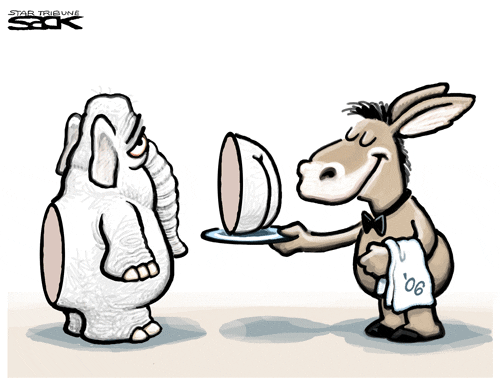
So, yeah, I'm in a good mood. In fact, I'd say 52% of the country is in a good mood (and if you believe all of the voter suppression stories, the number's a lot higher than that.)
But having won the election, pushing the venal and corrupt out of positions of power, we have to look to the future. It's not enough to mock and ridicule the policies and tactics of the government of the past.
We have to figure out how to mock the policies and tactics of the government of the future.
I'm thinking, specifically, of The Daily Show. Yeah, it's been on the air since 1996, when Clinton was still president, but we all know it didn't really take-off until 2002-3, when, between domination of Congress, the Iraq War, and the upcoming 2004 election, the Republican's provided Jon Stewart with a steady stream of inane or hateful rhetoric, shameless pork barrelling and barely hidden corruption, desperate, insane pandering to a looney conservative base, and ass backward hunting accidents.
With a Congress that won't rush through Bush's latest crazy bill written by his corporate or evangelical masters, WILL investigate Abu Ghraib and Guantanamo (and the secret prisons. And the wire-tapping... And...), won't make a national case out of personal, family tragedy, WILL react to a national emergency BEFORE it makes landfall, and maybe, maybe, maybe, actually looks at the facts and evidence before deciding policy, rather than seeing what the policy is before deciding what the facts are...
won't Jon Stewart's job be a lot harder?
Sure, The Daily Show will still have their biggest target, W, to kick around for the next two years, and their second biggest target, the cable news networks, will still be around after that, but man, the Republicans sure did provide a lot of grist for the mill for six years there. I'm sure the Democrats will still provide some much needed crazy (and I'd rather have good government and bad comedy than vice versa), but it just won't be the same.
And as hard as it will be for Jon Stewart, how much harder will it be for (noted genre geek) Stephen Colbert? Stewart acts as himself, a topical comedian, his targets are always those in power, regardless of ideology. Colbert, however, has a more specific target in mind, the conservatives and their media machine. His character, "Stephen Colbert," is a mouthpiece for the Republican administration, a repeater and "unintentional" inverter of RNC talking points. If Hastert and Frist are not setting the agenda on the Hill, controlling both the timing of debates and the terms and conditions, where will "Colbert" get his marching orders from (and Colbert his punchlines)?
It would be funny, and actually in character for "Colbert," whose massive self-centeredness masks crushingly low-self esteem and a need to ride the coattails of those more popular, if he suddenly turned into a talking head for the left. He couldn't do it right away, with Bush still in the White House providing better crazy, he might not do it for a few years, but it'd be great if on November 5, 2008, when [insert your Democratic candidate of choice here] declares victory, "Colbert" cheers loudly that it's a victory for him personally, since he's been a long time supporter of liberal causes.
So how do you make fun of the Democrats? Wait, let me amend that. How do you intelligently make fun of the Democrats? I've heard most of the jokes, "cowards," "bumbling," "corrupt," "immoral." But lets face it, there was one party composed of draft dodgers, one who let Iraq fall into a civil war, North Korea to get a nuclear bomb, and watch an American city wash away, one party that was funded by a massive bribery campaign, one party that protected a pedophile because they were worried about losing his seat in congress,
and it wasn't the Democrats.
So what CAN we make fun of the Democrats for? Or should we let history decide?
Posted by
Steven
at
10:09 AM
3
comments
![]()
Labels: Politics, The Colbert Report, The Daily Show
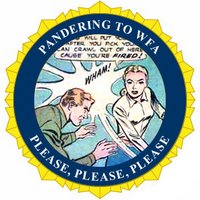 On Tuesday, I posted about how happy I was that two of my favorite characters, who have never met despite having linked origin stories, were going to fight for the first time, written by one of my favorite writers. And I got linked to by When Fangirls Attack.
On Tuesday, I posted about how happy I was that two of my favorite characters, who have never met despite having linked origin stories, were going to fight for the first time, written by one of my favorite writers. And I got linked to by When Fangirls Attack.
Which is great (sweet, sweet hit count), but honestly surprised me. Usually, I know when a post is going to get linked to, sometimes I practically beg to get linked to, but this was just me squeeing over a possibly Apokoliptian rumble. In retrospect, I should have expected it, because, after all, Big Barda, Knockout, and Gail Simone are all women. In comics.
Which meets the technical definition of an on-topic post, of course, but not, as I understood it, the grander vision. It wasn't really a post about "women in comics." It was more a post about a writer and characters who happened to be women. (I didn't even make my Secret Six joke that if Simone was writing about superpowered redheads fighting, they almost certainly were going to be fighting in the nude.)
Is this good? That's an honest question. Is it good to emphasize the mere presense of women in comics? I mean, it bugs me when people call Simone "one of the best female writers." No, she's just one of the best writers, no qualifier. This isn't the same thing, I know, but...
Was it because it was all women? I post about the Justice League all the time, which includes a woman or two, but that doesn't usually get linked. If Mark Waid was going to write the proposed Barda v. Knockout brawl, or if it was going to be Orion vs. Knockout instead, would it still have gotten linked?
Or was it just that Ragnell liked the post and wanted more people to read it? (which would be TOTALLY COOL!)
Anyway, the point of this post was that I really like When Fangirls Attack, I like the writers behind When Fangirls Attack, and I LOVE getting linked to by When Fangirls Attack, but I was kind of curious about what gets linked and what doesn't, sometimes.
And to guarantee that this post gets linked to as well, here's the ickiest daddy/daughter relationships found outside of Cinyras and Myrrha, courtesy of John Rogers, who's totally a comics writer now, so it counts.
Posted by
Steven
at
12:02 PM
3
comments
![]()
Labels: Big Barda, Gail Simone, Gender, Knockout, When Fangirls Attack
If the Question was one of the greatest beneficiaries of Hypertime, his Charlton cohort Captain Atom was one of its greater victims. While new versions layered interesting characteristics and interpretations onto Vic Sage, the same versions stripped whatever was interesting about Nathanial Adam away. DC already had a nuclear powered accident survivor by the time Captain Atom was introduced, as well as military men turned weapons of mass destruction, and soldiers from another era trapped in the present. And once it was clear how he wasn't like those people, he became defined by only one aspect, and, as Dave Campbell points out, it's not a very compelling one:
Captain Atom is a tool. Whenever writers need an asshole superhero, they get Captain Atom. He’s constantly trying to beat up other heroes on behalf of the federal government.And that's basically it. His defining feature is that he's as powerful as Superman, but he obeys the authorities, and it's always the wrong choice to make. And since Captain Atom is also portrayed as honest and sincere, he comes across as insanely naive, if not a little mentally handicapped.
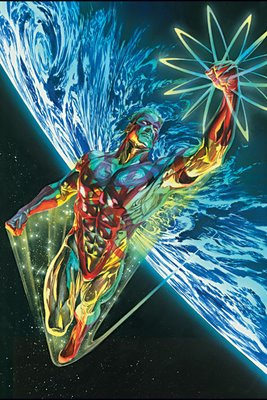
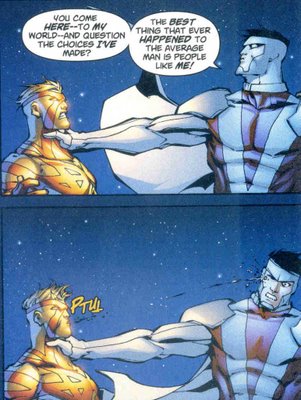 Captain Atom: Armageddon is probably the best inter-company crossover I've ever read (which I know isn't saying much but...) because it actually contrasts the characters that meet, rather than the usual misunderstanding, fight and team-up model. The Wildstorm characters see the establishment asshole that Captain Atom is usually portrayed as. But from Captain Atom's point of view, he's trapped in a world ruled by amoral, hyper-violent superheroes who have terrified the populace into submission. There's no misunderstanding, they understand each other perfectly. That's why they fight.
Captain Atom: Armageddon is probably the best inter-company crossover I've ever read (which I know isn't saying much but...) because it actually contrasts the characters that meet, rather than the usual misunderstanding, fight and team-up model. The Wildstorm characters see the establishment asshole that Captain Atom is usually portrayed as. But from Captain Atom's point of view, he's trapped in a world ruled by amoral, hyper-violent superheroes who have terrified the populace into submission. There's no misunderstanding, they understand each other perfectly. That's why they fight.
Posted by
Steven
at
4:38 PM
5
comments
![]()
Labels: Captain Atom, Charlton Comics, DC Comics, Hypertime, Recommendation, Steve Ditko, The Authority, The Question, Watchmen, WildC.A.T.S, Wildstorm, Will Pfeifer
From the Newsarama Gail Simone interview:
"Should be worth it for Barda vs. Knockout alone."
Barda vs. Knockout. Wow. It... it's like being given a birthday present and you didn't even know it was your birthday. I hadn't realized before but it turns out I have been waiting for that very moment since reading Superboy #25, Knockout's origin issue.
Um, wow. Gail's just been handing out the presents all over the place.
Thanks, Gail!
Posted by
Steven
at
2:39 PM
1 comments
![]()
Labels: Big Barda, DC Comics, Gail Simone, Knockout, Superboy
Nostalgia doesn't take long to set in. It seems that only ten years after anything, people forget about how terrible something is and start clamoring for more. Hence: Onlslaught Reborn.
Big fear for 2007?
THIS:
is a sequel to THIS:
Posted by
Steven
at
12:16 PM
5
comments
![]()
More offensive? OR
OR  ?
?
Posted by
Steven
at
4:02 PM
0
comments
![]()
Labels: 52, Agents of Atlas, DC Comics, Marvel
The Obligatory Heroes Post
I didn't want to like Heroes going into this season. It looked like yet another Smallville, a superhero show by people embarrassed to be doing a superhero show, so there wasn't going to be any costumes and it would trade more on Joseph Campbell's hero's journey and less on Jack Kirby's clobbering time. It certainly didn't didn't help that the pilot is pretentiously titled "Genesis" and the show seems to be based around a variation of the mutant gene. (as in, Mutant Gene, Why I Hate).
But it was the show on before Studio 60, which I was looking forward to (disappointingly), and I'm still as sucker for superheroes, so I tuned in to the pilot, where my low expectations were met. Except... it had that last minute twist that I honestly didn't see coming, and it had Hiro Nakamura, which made me just interested enough to catch the next episode, which made me just interested enough to catch the third, which kicked off with a moment that sealed the deal for me, but more on that later.
Heroes is a really good show. Like all great shows, Heroes greatest strength it its cast. They are across the board strong, which is impressive in a cast so large, with the noteworthy standouts of Hayden Panettiere (whom I've loved since she voiced Kairi in Kingdom Hearts) and Masi Oka.
Its second greatest strength is that the sucker moves. In a season where half a dozen shows warn their audience that there would be no resolution until May Sweeps, Heroes promises to set off a nuclear bomb in Mid-Town Manhattan in time for Veterans' Day.
And there's the cleverness with the powers. Lyle at Crocodile Caucus noticed that the badass powers, rage-powered superstrength and a hyper-healing factor bordering on immortality, belong to the women, while the men have more passive powers, telepathy, phasing, vague premonitions. The special effects are well done, especially for television and particularly the flights, which has plagued TV Supermen going back to George Reeves.
There are weaknesses. Some they've overcome: the pretentiousness of the pilot has been largely dropped or mollified. Some they haven't: both of the women have been sexually assaulted in only five episodes, and "Save the Cheerleader"? I mean, she's indestructible. Why not "Save the Emo Nurse with the MySpace Haircut?"
But I can ignore most of that because of Hiro Nakamura, the sensational character find of 2006 (sorry, Batwoman). He's easily the standout character of the show. He brings an energy to the show that drives the whole thing forward. The pilot is slow and ponderous, but the moment Hiro shouts "I DID IT!" in the middle of Times Square, with the camera orbiting him in a mad frenzy, the episode and the series comes roaring into life. (Followed up by "HERRO NEW YORK!" which is probably highly offensive, but I laughed anyway.)
A lot of critics think Hiro's appeal is that he's the fanboy made good, who knows his X-Men back issues and is excited (but not terribly surprised) to learn a future version of him exists and carries a sword. But that's not exactly it. We've seen that character before and usually, we hate him. See: Wesley Crusher (sorry, Wil Wheaton). Others say it's that he embraces his power, while the others are scared or ashamed. But Peter Petrelli embraces his power too, but I don't like him much*.
No, what makes Hiro a standout character is that he embraces being a superhero. Peter wants "to be somebody." Hiro wants to save lives. The moment for me, the moment I realized I was in, was the start of the third episode. Hiro's come back from his time traveling adventure, where he's discovered both the nuclear threat and a comic that can predict his future. But he has to cut short because "a little girls life depends on us". And he says this with ZERO IRONY.
Which is refreshing. There's just no way Buffy could have pulled off that line, or any superhero post-Adam West. It's just too spot on, too "this is what we do." But Hiro doesn't find saving lives absurd. Or even that heroic. He doesn't want praise for it, or recognition. He knows he has a power and with that power the responsibility to help people. He's already disappointed with himself for not being able to save everyone he could, and a close relative didn't need to get shot or nothing.
If the producers of Heroes were really brave, the pilot would have been just Hiro, and it would have followed his story for an hour from discovery of his powers through witnessing the bomb going off. Sure, it would have been mostly in Japanese and left a lot of the other characters in the wings, but it would have gotten most of the themes and even major plot points onto the table while hinting, with a newspaper headline here, an internet video clip there, a brainless dead body on the floor, at the other storylines. But mostly, it would have given Masi Oka more room to play. He really is delightful every time he uses his powers or asks himself "W W S-M D?" I'd be perfectly happy if the show was just about him.
And Hayden Panettiere. She's super cute.
*okay, I didn't like him much, until they revealed Peter doesn't really have a super power, he has other people's super power. It was a perfect power for Peter's personality, and made me particularly curious what happens when he finally meets Niki (and Niki's evil other half).
Posted by
Steven
at
3:11 PM
3
comments
![]()
Labels: Gender, Heroes (tv show), Mutant Gene, TV
First off, yes, in '99 I went as Clark Kent. It helps if you already have the glasses, a suit, and superman t-shirt, and a fedora to really complete the look.
Which brings up the spit curl, Superman's "cheating cape." The little "S"-shaped hair thing that hangs in front of his face.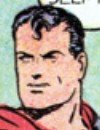
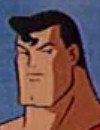
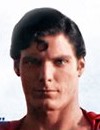
Because it's NOT really a spit curl. A spit curl is plastered with gel to the forehead. What Superman has is a loose forelock. It gives him a "boyish charm," (thanks, BB) like he's so busy saving lives that he doesn't have time to comb all his hair. It just happens to form the shape of an "S." It just happens to ALWAYS form the shape of an "S." In comics, you can do that.
But you can't in real life. Not on film, or television, or your Halloween costume. A loose forelock is lucky to curl attractively at all, let alone a symbolic double curve. Mine would go straight up, my brother's would endlessly curl into itself. So the make-up artist plasters that sucker down with a beehive of wax.
Which looks WRONG. And it looks wrong because it looks like CLARK gave himself that ridiculous hair-do BEFORE RUSHING OFF TO SAVE SOMEONE. So the hair "S" goes from a sign of how much Clark values people over his hair to how much Clark values his hair over people.
The dick.
Anyway, I thought was another example of one of those things that works in comics, but just doesn't when transported to other media. Flight, psychic ability, transformation, those cross over fine. But size changing capes and meaningful haircuts? Not so much...
Posted by
Steven
at
6:21 PM
1 comments
![]()
Labels: costume design, DC Comics, Superman
Hey, I'm back. Miss me?
I want to talk about last pages. It's really the advantage of the singles over the trade. The shocking reveal. The nail-biting cliffhanger. The joke and freeze. Even the summation, moral, and coda. The great last page confirms "Yeah, you just read A Story, a real story, and don't it suck for you that you have to wait a whole 'nother month for what else we got in store." You lose that in the trade. Golden moments, like Superman and Lex Luthor plummeting to Earth in Up, Up, and Away, are frozen in time as you wait weeks for the next issue. In the trade, it's just another page in the middle of the book.
Yeah, it's arbitrary, a product of the medium rather than a creative choice, but good creators can make the boundaries work for them. I bought six comics last week* and all but one had BRILLIANT last pages. (The outlier was Boys #4, which is probably my new definition of "wait for the trade.")
Secret Six #5 employed the classic, reveal and cliffhanger one-two: forgotten character reappears, then immediately puts our heroes in mortal jeopardy. Now you have to read issue #6, the conclusion, to see how our "heroes" get out of this one. If they get out of this one.
52 #25 does the classic with a double twist. Not only does the mysterious mastermind behind the Island of Mad Scientists step forward to imperil Black Adam and Isis, his identity turns out to be a new twist on an old, buried character, and his particular threat references earlier clues in the series itself, drawing the disparate plots together.
Action Comics #844 has a reveal, but really the last page serves as a summation and conclusion. It ends the chapter being told. The story could conceivably just end on that last page, since it establishes a new but relatively stable status quo. Not that it will, because there's a "to be continued" hiding in the bottom right corner and the new status quo is too big a change to be confined to just one book.
Nextwave #9, plotwise, doesn't have that great a last page. Nothing's revealed. The heroes are in no more or less danger on the last page then they were six pages earlier. It certainly isn't the end of the story, or even the beginning of a new one. But it was a PERFECT last page. Because it contained a joke--a joke so powerful that I could not continue reading. That's right, Ellis and Immonen knew that anything read after that page would be lost in its massive wake, so they moved it to the end where it could do no harm to the rest of the story, while at the same time positioning the joke for maximum focus, making it more powerful than you can possibly imagine! But of course, the comic of the week, my HANDS DOWN pick, is Seven Soldiers of Victory #1. And it had THREE great last pages. Sure it could have ended on page 37. With its narration directed at the reader and image and panels that recall the first page of the first issue of Seven Soldiers, it would have been a nice bookend. Or it could have ended with page 38, the twist ending. But like Nextwave before it, Seven Soldiers had a moment, an image so powerful that it FORCED itself to the last page. The moment certainly isn't the end of the story. It's not even a very important moment to the main plot.
But of course, the comic of the week, my HANDS DOWN pick, is Seven Soldiers of Victory #1. And it had THREE great last pages. Sure it could have ended on page 37. With its narration directed at the reader and image and panels that recall the first page of the first issue of Seven Soldiers, it would have been a nice bookend. Or it could have ended with page 38, the twist ending. But like Nextwave before it, Seven Soldiers had a moment, an image so powerful that it FORCED itself to the last page. The moment certainly isn't the end of the story. It's not even a very important moment to the main plot.
But the image IS the story of Seven Soldiers. It's a monument to unending nature of comics, that every last page is an advertisement for the next issue, that every death and birth is there for later writers to undo and redo. It's an image that mixes the macabre with the sacred, the simple with the mysterious, the absolute mundane with the beyond fantastic. It's an image that says superheroes can do impossible things, and that's why we love them. It's a moment so great that there just can't be another page, even though it's a last page that SCREAMS "TO BE CONTINUED!!!" without saying a word. It has to be the last page, because after seeing that page, there's nothing left to say...
until next month...
*yeah, vacation doesn't stop the habit. Once, when traveling through Alaska, I made a stop at the world's most Northern Comic Book store to pick up Zero Hour #0, which was out that week.
Posted by
Steven
at
10:10 PM
4
comments
![]()
Labels: 52, Action Comics, Boys, DC Comics, Grant Morrison, Marvel, Nextwave, Secret Six, Seven Soldiers, Wildstorm, Zero Hour
I know I said I was going on vacation, and I swear it's this last post then I'm gone, but how could a pass up the opportunity mention the Earth-New return of...
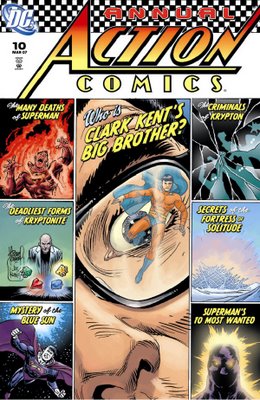
Posted by
Steven
at
12:16 AM
0
comments
![]()
Labels: Action Comics, DC Comics, Go Go Checks
Going on vacation for a week, so new post for a bit.
In the meantime, I leave you with some random thoughts.
Hey, Robert Kirkman, if you want to read about "an inexperienced hero who would get beaten up constantly and probably die," check out this week's Robin. Or Birds of Prey. Or 52.
The only thing that would have made the page of new heroes shouting their stupid names better is if they had shouted them in Logo Font.
Speaking of, Red Tornado looked beyond the veil of universe and saw 52... what? My guess: 52 other universes (which, including the universe he was in at the time, would be a full pack plus a wild card). And they're coming.
If the conversation on superheroes and class is going to keep going, we might want to start defining our terms. I realize in my own arguments I'm getting thrown off my point a lot by confusing aristocracy, wealth, style, education, power, and morality. The original question was whether the superhero genre perpetuates the myth of aristocracy, that some people are just born to rule. That's shifted a bit into whether Batman fights social injustice and why aren't more superheroes classy, with claims of anti-intellectualism thrown in.
The anti-intellectualism claims really bother me, for some reason. There's this odd assumption that having an education, particularly a post graduate education, is synonymous with being upper class, an influential figure on the course of society, which just isn't true. Most of the academics I know toil in obscurity (and read this blog! Hey, Aaron, David, and Jeff)!. As Cole points out, Kal-El is not a lost prince of Krypton. He's the son of a smart but not highly respected scientist. Meanwhile, Bruce Wayne (who we all agree runs Gotham, yes?) never even went to college. And back in the real world... well let's just say that being a total and complete moron doesn't stop you from getting elected President.
Casanova is a heck of good read. As is 100 Bullets, which has started barrelling towards its conclusion.
Has it really been a month since ANY issue of Superman's three ongoings have hit the shelves? And I have to wait till December for more All-Star goodness? C'mon! I'm starting to feel like a Green Lantern fan over here.
Speaking of, sort of, Morrison Batman run filled-in by The Spectre team of Ostrader and Mandrake? Yeah, I'll take that.
Yes, I heard about NextWave. No, I'm not surprised. No, I haven't rent my garments nor gnashed my teeth. Yes, that will be one less Marvel title I'm buying. Yes, I'll probably pick up whatever NextWave limited series come down the pike. No, I'm not buying Thunderbolts.
Posted by
Steven
at
11:50 AM
0
comments
![]()
Labels: 100 Bullets, 52, Batman, Casanova, Class, DC Comics, Grant Morrison, John Ostrander, Logo Font, Marvel, Nextwave, Red Tornado, Robert Kirkman, Superman, The Spectre, Tom Mandrake, Warren Ellis
In my People's Superman post, I mentioned that Superman being an anti-aristocratic hero is an exception to the rule, that most superheroes are aristocratic in both background and behavior, and the best example of that is...
Batman.
Yes, Batman.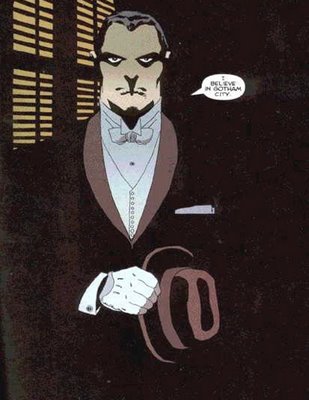 Batman isn't just "the man," Bruce Wayne is also The Man. He's a rich, white, handsome man who comes from an old money family and is the main employer in Gotham. He owns half the property in the city. In a very real sense, Gotham belongs to him, and he inherited all of it.
Batman isn't just "the man," Bruce Wayne is also The Man. He's a rich, white, handsome man who comes from an old money family and is the main employer in Gotham. He owns half the property in the city. In a very real sense, Gotham belongs to him, and he inherited all of it.
Accordingly, Batman has an enormous sense of entitlement. Batman just assumes he's right in every situation. It's his city. If he doesn't like you, he'll tell you to leave. If Batman thinks you're guilty of a crime, he'll put on his pointed white hood black mask and beat the crap out of you. Laws? Civil rights? Due process? Those are for other people. Yes, the people may have elected a mayor, pay taxes to employ the police. Batman could work with them, but they're all corrupt, weak, not as good as him. (Except Gordon. Batman has generously determined that Gordon is worthy to contacted, though he always disappears before Gordon's done talking, just to remind Gordon who's the bitch in this relationship.)
And look at who he fights! Superman fights intergalactic dictators, evil monopolists, generals, and dark gods. Batman fights psychotics, anarchists, mob bosses, the mentally frail, and environmentalists. Superman fights those who would impose their version of order on the world. Batman fights those who would unbalance the order he imposes on Gotham. Consider the Penguin. He's a criminal, a thug. But what really distinguishes him is his pretensions to being upper class. The tux, the monocle. The fine wine and fine women. Running for mayor. He tries to insinuate himself with actual socialites, some of whom are attracted to his air of danger, but most of whom are repulsed by his "classless" manners. And when his envy and resentment of his "betters" turns to violence, Bruce steps in to teach him his place.
Consider the Penguin. He's a criminal, a thug. But what really distinguishes him is his pretensions to being upper class. The tux, the monocle. The fine wine and fine women. Running for mayor. He tries to insinuate himself with actual socialites, some of whom are attracted to his air of danger, but most of whom are repulsed by his "classless" manners. And when his envy and resentment of his "betters" turns to violence, Bruce steps in to teach him his place.
And it's not just Mr. Cobblepot. Hugo Strange, Black Mask, Facade, Catwoman, all villains from lower class backgrounds who want to be upper class, who want to hobnob with the rich and famous at one of Bruce's fabulous fetes, but just can't pull it off (well, Catwoman can, but Selina's in a class all by herself). Even Harvey Dent, before he became Two-Face, envied and resented his friend Bruce Wayne, because Wayne had money and Harvey had to work for everything he got. And then there's the villains who have a vendetta against C.E.O.'s of powerful corporations, either for revenge (Mr. Freeze, Clayface) or out of principle (Ra's al Ghul, Poison Ivy). There's a class war going on in Gotham, and Batman has taken the side of the rich.
Like Superman, there's an Arthurian "king-in-hiding" element to Batman's origin. "Banished" from Gotham by the death of his parents, Bruce Wayne returns to redeem his land and reclaim his throne. But instead of reclaiming it from usurping uncle or foreign invader, Batman must take Gotham back from a rising underclass.
And Batman doesn't even like the upper class he belongs to, either! Shallow, petty, boring, vain. They know nothing of the pain and suffering he sees every night when he hunts killers through the slums of Gotham, every day when he closes his eyes. He mockingly refers to himself as a "plutocrat" in last week's JLA: Classified, dismissing both value of plutocrats and the intelligence of a dictator who courts them. But does he dislike his wealthy peers because they don't appreciate how wealthy they are? Or is it because they aren't wealthy enough to appreciate how much responsibility he has?
And even if he thinks they're upper class twits, he really doesn't do anything about it. He leaves them in place, protects them from harm, flirts with and beds them. They're not the bad guys, after all. It's all those poor evil people. The one's who keep crashing the gate, who happened to be accidentally hurt in the hunt for profit. No reason Batman should try to protect them, keep them from getting crushed under the weight of capitalism.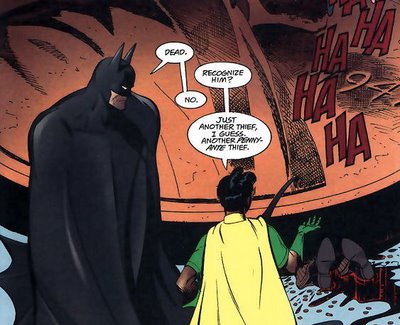
They're just "penny-ante". And Bruce is a plutocrat!
Posted by
Steven
at
12:20 AM
7
comments
![]()
Labels: Batman, Catwoman, Class, DC Comics, Superman, The Penguin
Posted by
Steven
at
12:17 PM
2
comments
![]()
Labels: Avengers, Captain America, Hulk, Iron Man, M.O.D.O.K., Marvel, Spider-Man, Storm, Wolverine

"He's got...lifeless eyes, black eyes, like a doll's eye."
or
Seen here carefully constructing his war machine
or
"And don't wear red!"
or
I bet Giraffo's behind this, somehow.
(thanks, Brandon, for meme and image)
Posted by
Steven
at
6:07 PM
3
comments
![]()
Labels: Bully, Meme, Suicide Squad
Hey Everyone! How ya been?
First up, thanks for the links, anonymous posters on The IMDB and Television Without Pity message boards. With your help, I cracked the 10,000 mark. (and while I appreciate being considered an "expert" on Lois Lane, the idea of "Chlois" just creeps me out to no end, possibly because it sounds too much like "Clor".)
And thanks to Ragnell for conscripting me into Beefcake/Cheesecake Week. It saves me the trouble of having to come up with a separate post. (and HOLY! Is this the kind of traffic you get everyday?)
This response from Robert Kirkman to the strong criticism of the death of Freedom Ring got me thinking. Kirkman cops to being too clever by half, basically, taking two really good ideas for a superhero ("being superpowered isn't enough to make you a superhero" and "being gay is not the beginning and end of defining a character") and muddling them both by combining the two. While clearly not his intention, a very clear interpretation of the result is that Freedom Ring was killed because he was gay.
What I started thinking about was how Kirkman could have told the first idea without getting into trouble. (The idea of a superhero actually suffering and sacrificing to do his job, obviously, interests me.) And I realized the only way he could have done it is if Freedom Ring was a straight white male.
If Freedom Ring was black, or Hispanic, or Asian, or if he were a she, then Kirkman might have been accused (rightly accused) of implying that Freedom Ring was incompetent because he was black, because she was a woman.
But no one would reasonably say he would have died because he was male, or white, or straight. For storytelling purposes, a straight white male is neutral, contains no value that informs or overwhelms other, subtler personality traits.
It reminds me of something I read in... a book whose title escapes me now, but I'll remember later a book by Douglas Hofstadter. It said that you can't start a joke "a woman walks into a bar..." unless the joke was about her being a woman. If the punch line is "I was talking to the duck" then the listener is left wondering why you specified the lead as a woman. This does not happen if you say "a man walks into a bar..." "Man" is a blank template, and if his sex is not essential to the story, no one tries to figure out why you brought it up. For some reason, "man" is less specific that "woman."
Which is crap, of course. In reality, being straight, being white, or being male, DOES inform character just as much as being gay, black or female. So those traits SHOULD inform the writing and reading of characters just as much traits that aren't "neutral". Which is to say a little, but not entirely.
The solution, I feel, is just having more and more varied characters who are gay (or who are black or Hispanic or who are women), so that the "value" of "gay" is weakened until the unique person shines through.
But it does put Kirkman in a bind for writing a character "who happens to be gay," right now. Without counter-examples of competent gay superheroes to compare Freedom Ring to, it's hard to argue that the failure and the gay have NOTHING to do with each other.
He certainly shouldn't have told the story at Marvel, which has so few gay characters. It would have been better, but not much, in the DC universe, where at least Obsidian, Piper, Montoya, and Maggie Sawyer kick ass.
But in the Wildstorm Universe, where the two baddest bastards on the planet also happen to bone each other, Freedom Ring's story would have taken on an entirely different meaning. There, the lesson would be "being superpowered AND gay isn't enough to make you a superhero." And that's a story I can support.
Posted by
Steven
at
10:36 AM
2
comments
![]()
Labels: Clor, DC Comics, Freedom Ring, Gender, Marvel, Midnighter, Robert Kirkman, Wildstorm
Ahh, that's better. Now I feel like I have some room to breath. Certainly my posts with big images, like my recent post on the myth of aristocracy look a lot better now. And I followed through on my promise of adding a greatest hits section (based on hits and links).
Went to the store today. A slow week for me. The most enjoyable comic was 52, which enjoyably progresses a plotline or three. Nothing surprising, (except maybe the religion bit), but well executed, particularly the tan line. I mean, the line about the tan.
Whatever.
But the most interesting comic, the one that stuck, was JLA Classified #28. Howard Chaykin started from the same basic premise as Gail Simone's run (Justice League intervenes in international politics) and goes in a very different direction. There's a lot of smart writing going on there. The two fictional South American nations featured supposedly have radically different ideologies, one communist, one capitalist, but the rhetoric does little to disguise the fact that they are nearly identical dictatorships. (Though I should note the capitalist dictator welcomes "plutocrat" Bruce Wayne with open arms, while the communist opens up to, of course, that old leftist Clark Kent.) And even though it's clear they're both bad guys, it's not black & white whether the Justice League is doing more good than harm by intervening, which is nice. There's even a crack about the American comics industry that's both nicely done and awfully mean.
The art's good, not great. Tom Nguyen really does make every penciller's work look like Doug Mahnke, but weak Doug Mahnke. And it's a three or four issue story at most, unfortunately told over six issues. But it's a good solid Justice League story where Wonder Woman and Batman actually hit people instead of bitching at each other from across a table, so I'd recommend picking it up.
In other news, Earth Prime has in fact bled into the DC Universe, as Infinite Crisis the book shows up in Gotham book stores. And as before, what is fiction here becomes non-fiction there.
But if Superman, Batman, and Wonder Woman are missing, how did the writer learn what happened on the moon?
Damn it, Frey! Not again!
Posted by
Steven
at
7:26 PM
1 comments
![]()
Labels: 52, Class, DC Comics, Doug Mahnke, Gail Simone, Howard Chaykin, Infinite Crisis, Justice League, Tom Nguyen
So I've upgraded to Beta Blogger and, except for an inability to figure out how to hide full posts behind jumps, everything seems to be working fine.
I've taken the opportunity to tweak the blog a bit, adding some of my (non-comics) blogging friends to the blogroll.
Also, since I haven't updated the old blog since starting this one, I've decided to just go ahead and make this the one and only, so expect a few OT posts (though the majority will still be comics).
I'm also planning on adding a "Greatest Hits" section to the side-bar, so that the random reader who follows a link to a particular post can see others they might enjoy. Any suggestions? Posts you particularly liked? The kind of post that made you say "That's it, he's going on the list!"
In other news, last night I was at The Big Quiz Thing. Question #3 was "What strange 60s superhero team consisted of Chief, Robot Man, Elasti-Girl, and Negative Man?".
Needless to say, we came in first.
Posted by
Steven
at
9:25 AM
0
comments
![]()
Labels: Doom Patrol
Lois Lane doesn't take shit from nobody.
Ragnell has a post about power fantasies for women, specifically inspired by a scene where a guy's a jerk to Witchblade in her civilian persona, and instead of slugging the guy, she demures while her male companion does the hitting for her. Ragnell felt the scene was terribly unsatisfying, and was angered by the implication that it was inappropriate for a woman to lash out in violence, but okay for her man to protect her, even if she didn't need it.
To see if I agreed with her, I tried to imagine a gender reversed scenario, where the male hero demures from defending himself so his female companion slugs the guy for him. And then I realized I didn't have to imagine it, that story already exists...
... in Action Comics #1.
That's right, Lois Lane does not hesitate to smack a guy who needs hittin'. It's not always the smartest move (i.e. her opponent in this case is a gangster who tracks her down and kidnaps her, prompting the most iconic image in superhero comics), but foresight has never really been Lois's strong suit. She's more of a "leap off the building, trust someone will catch me" type. For a character whose motivation and personality has shifted a lot over her nearly 70 year existence, hard-driving ball buster has been pretty consistent.
Even at her weakest, the "If I prove Clark Kent is Superman, he'll have to marry me" Silver Age crazy period, Lois doesn't let a simple thing like constantly and publicly being proved wrong deter her from her strongly held conviction that Superman and Clark Kent are in fact the same person.
(Especially because she's, y'know, absolutely right, and if Superman didn't have a large supply of Superman robots and time travel technology, she'd have proved it years ago. I'm guessing there's an Elseworlds or Astro City type story yet to be written where Lois is the only intelligent person on Earth who can see though Clark's flimsy disguise, and is desperate to prove it to the rest of the world, but Clark, through a series of increasingly improbable feats, keeps everyone else fooled in a sadistic campaign to gaslight Lois.)
Anyway, my POINT is that Lois always acts out, never compromises, NEVER demures. Boundaries are for other people. In fact, one could say, Lois always acts the way Clark only acts when he's in costume. That is, LOIS is the hero Clark wants to be.
And that's pretty damn cool.
(Hey When Fangirls Attack! and Meanwhile! Thanks for the link!)
Posted by
Steven
at
11:03 AM
3
comments
![]()
Labels: Action Comics, DC Comics, Gender, Lois Lane, Superman
 Many a man fails as an original thinker
Many a man fails as an original thinker
Posted by
Steven
at
10:19 AM
1 comments
![]()
Labels: Family Circus, Nietzsche
So, what's the over/under on how many years until Marvel releases Ultimate Civil War #1?
And for the perfecta, how many years after that does issue #7 come out?
Posted by
Steven
at
9:54 PM
2
comments
![]()
Labels: Civil War, Marvel, Ultimate line
There's a lot of interesting stuff at this interview with Kurt Busiek at Newsarama, including an image (via Shane) which will almost certainly be pulled down which has already been re-edited by DC publicity by the time you read this. (but Shane has the original. hee hee)
Second most interesting to me, of course, is Kurt Busiek's post Infinite Crisis instructions from DC Editorial:
Infinite Crisis was the moment where DC kind of threw everything up in the air and said, "Okay, guys, pull it all back together again. You can pick bits from anywhere – from the comics, the movies, the cartoons, whatever – and polish it all up and make it go."(emphasis mine)
Posted by
Steven
at
4:43 PM
11
comments
![]()
Labels: Carlos Pacheco, DC Comics, Hypertime, Infinite Crisis, Kurt Busiek, Naughty Bits, Silver Twist, Superman, Superman: Secret Identity
In which I put on the turban and do my impression of Carnak.
But first, let's check in with my last prediction, that the mastermind behind the theft of the Red Tornado's android body is The Top. Well, we got another clue this week when the shadowy figure says he was stupid, but isn't any longer. That REALLY limits the possibilities, down to basically Dr. Light (who was mind-wiped and regained his memory in Meltzer's own Identity Crisis) and, well, the Top (who was brainwashed and regained his memory in Geoff Johns's run on The Flash). So my bet's looking pretty good.
As for the new prediction: Little Barda is Knockout's daughter.
Okay, there's been very little information given about the Big Barda-wannabe. Early speculation was that she was Avia Free, Scott and Barda Free's daughter in the Elseworlds Kingdom Come. This despite ANY evidence that Scott and Barda had a daughter (a teen daughter at that) and just failed to mention it. What we do know about Lil' Miss Thang is that she aspires to be Big Barda some day and has costume modeled on hers. A chance line from Power Boy indicates they are both actually from Apokolips, and not just humans with high aspirations.
Meanwhile, over in Secret Six, Knockout casually reveals that she had a daughter, but hasn't seen her since the girl was three (i.e. just old enough to have memories of her mother). And anyone who read Karl Kesel's run on Superboy knows that Knockout is herself a refuge from Apokolips who fled the Female Furies after being inspired by Big Barda's own escape.
Like mother, like daughter, eh?
Posted by
Steven
at
5:14 PM
4
comments
![]()
Labels: 52, Big Barda, Brad Meltzer, DC Comics, Gail Simone, Gender, Justice League, Knockout, New Gods, Predictions, Red Tornado, Superboy
Who would you rather have tell you that a great evil is coming and only you can prevent the destruction this Earth and every Earth throughout the multiverse?
This guy?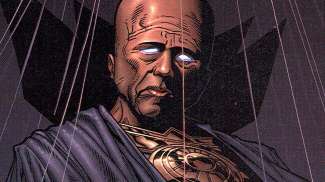
Or this guy?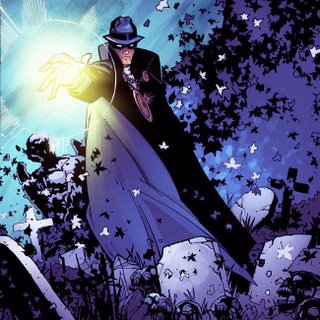
Now, neither of them are going to give you much to go on past, "Beware! Beware!" But the Watcher will be a bit of whiny jerk about not helping you, claiming he can't help you because he's "not permitted". Not permitted? Who's going to stop him, the Living Tribunal?
On the other hand, the Phantom Stranger's kind of stand-offish. I mean, he's been working with some of these superheroes since the beginning of time, and he's still a stranger? Shouldn't he be the Phantom Friend by now? Phantom Chum? Phantom Amigo? Phantom Casual Acquaintance?
Posted by
Steven
at
7:29 PM
10
comments
![]()
Labels: DC Comics, Marvel, Phantom Stranger, The Watcher
Spider-Man
The Thing
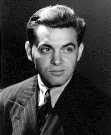

Posted by
Steven
at
7:23 PM
2
comments
![]()
Labels: Jack Kirby, Marvel, Spider-Man, Stan Lee, Steve Ditko, The Thing
Occasionally when reading fantasy, an author creates an image, an idea of such cosmic horror that the mere contemplation of which could drive men mad.
Whether it is the gruesome Grand Guignol of a Stephen King novel, the more metaphysic disorientation of H. P. Lovecraft's non-Euclidian worlds, or the stark depths of human cruelty detailed by Edgar Allan Poe, you read things that make you question the sanity, the morality, the very humanity of the author.
I came across one of those ideas today. One of the writers of 52 not only conceived this mind-killing meme, but decided to write it down and share it with over 100,000 comic book readers. Who was it? I want to know who is responsible for making me consider Darkseid's testicles.
Let me repeat that.


Posted by
Steven
at
10:31 PM
3
comments
![]()
Labels: 52, Darkseid, DC Comics, Naughty Bits
or, "Strange Women Lying in Ponds Distributing Swords is No Basis For a System of Government. "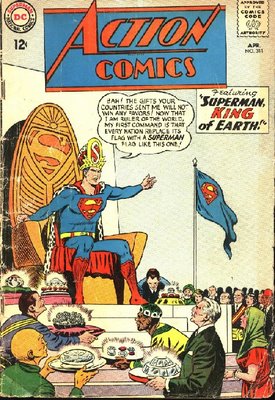 Once again, what started as a response to Matthew has grown into an entire blog post (including a little anti-Bush rhetoric and, to my surprise, praise for Infinite Crisis). In response to my last post that Superman was in fact a working class hero and his stories are anti-classist, he wrote
Once again, what started as a response to Matthew has grown into an entire blog post (including a little anti-Bush rhetoric and, to my surprise, praise for Infinite Crisis). In response to my last post that Superman was in fact a working class hero and his stories are anti-classist, he wrote
Everything you say about Superman is true. But you're talking about what Superman does, and what he thinks and believes and stuff. What I was talking about is who he technically is, and who he is is, basically, the Lost Prince of Krypton. He's like Carrot in the Discworld books.I meant to respond right away, but I couldn't tell whether our disagreement over the class of Superman was a minor semantic disagreement over the definition of the word "is" (which would be too minor to even argue) or a major philosophical one over the meaning of social class and the nature of hereditary predestination. I'm going to assume it's the second, even though there is no way to do that justice in one post of my comics blog.
This way, the Superman writers get to have it both ways. They can draw from the alien-aristocrat superhero archetype, but they don't have to make him act like it. (Contrast: Superman, and Dr. Tachyon from the Wild Cards novels.) This may actually be one reason (out of all the many reasons) why Superman is such a great character.
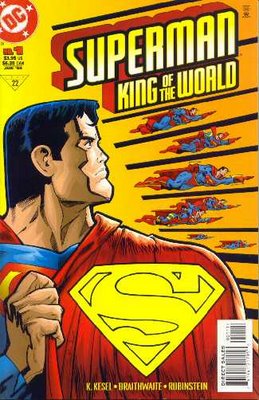 My problem with basing Superman's class on his genetics over his actions is that class is a social construct. It is only through what he and others consider him to be that we know what class he belongs to. And Superman chooses NOT to be a king (stories where Superman chooses to become a king will be ignored because they are terrible) The myth of aristocracy is that class is genetic, that some people are just born good enough to rule, and that this inherent goodness can be passed down from generation to generation (like the X-Gene!)
My problem with basing Superman's class on his genetics over his actions is that class is a social construct. It is only through what he and others consider him to be that we know what class he belongs to. And Superman chooses NOT to be a king (stories where Superman chooses to become a king will be ignored because they are terrible) The myth of aristocracy is that class is genetic, that some people are just born good enough to rule, and that this inherent goodness can be passed down from generation to generation (like the X-Gene!)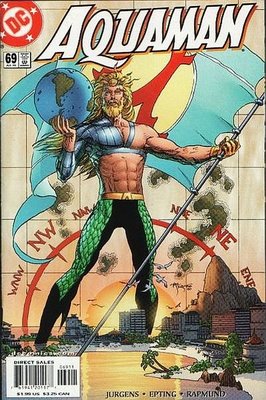 This is unlike almost every other superhero, by the way. Contrast Superman with Aquaman, for example. Like Superman, he was orphaned as a baby, raised in an alien world, and grew up as a human for at least part of his life (where he learned English and was christened Arthur Curry). But when Aquaman learned where he was really from, he rejected the surface world and threw in his loyalties to Atlantis whole-heartedly, in the more traditional Arthurian arch-type. (Ironically, to become King Arthur, he had to reject the name "Arthur.") Even given the chance, Superman would NEVER give up Earth to return to Krypton.
This is unlike almost every other superhero, by the way. Contrast Superman with Aquaman, for example. Like Superman, he was orphaned as a baby, raised in an alien world, and grew up as a human for at least part of his life (where he learned English and was christened Arthur Curry). But when Aquaman learned where he was really from, he rejected the surface world and threw in his loyalties to Atlantis whole-heartedly, in the more traditional Arthurian arch-type. (Ironically, to become King Arthur, he had to reject the name "Arthur.") Even given the chance, Superman would NEVER give up Earth to return to Krypton. Matthew brings up Carrot Ironfoundersson of the Discworld novels, another heroic king-in-disguise who refuses to take the throne. But that, I think, argues for MY point. Discworld, after all, is a satire of the myth of aristocracy (among many other things). Most of the other characters think Carrot should rule because of his unacknowledged heritage, but those that think that way are idiots and bad guys.
Matthew brings up Carrot Ironfoundersson of the Discworld novels, another heroic king-in-disguise who refuses to take the throne. But that, I think, argues for MY point. Discworld, after all, is a satire of the myth of aristocracy (among many other things). Most of the other characters think Carrot should rule because of his unacknowledged heritage, but those that think that way are idiots and bad guys.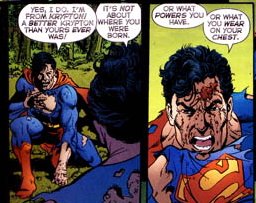
And, after laying Prime out, Clark lets him know what it's all about:
Posted by
Steven
at
7:02 PM
12
comments
![]()
Labels: Aquaman, Class, DC Comics, Discworld, Infinite Crisis, King Arthur, Kryptonians, Mutant Gene, Oedipus, Superman
 Matthew at the Legion Abstract has a great post about class and superheroes that you need to read right now and then come back here. This started as a response but it became very long and I remembered I have my OWN blog. (post on Detective 823 continues to be delayed).
Matthew at the Legion Abstract has a great post about class and superheroes that you need to read right now and then come back here. This started as a response but it became very long and I remembered I have my OWN blog. (post on Detective 823 continues to be delayed).
His claim, and it's one I generally agree with, is that superheroes as a genre tends to be "classist." Heroes tend to be either actual nobility, such as Wonder Woman or Aquaman, or very rich, like Batman and Green Arrow, and they fight to save the masses from themselves rather than fighting to change the social structure that keeps the poor in poverty. There are obvious exceptions, but that seems to be true, going back to the proto-typical stages of Zorro and the Scarlet Pimpernel.
My one disagreement with Matthew is that he classifies Superman as an "aristocratic" hero, and quite frankly I feel the opposite is true. Superman did and does fight for social change. In the Superman Archive, he clearly starts out as a populist hero, a champion of the working class, taking on war profiteers, state-run orphanages, crooked boxing promoters and poor mining conditions. Watch Superman lead a party of upper class twits into a mine and then bury them alive to teach them a lesson and tell me that's not a guy who fights the power.
And today he fights against class elitists like CEO (and ex-PRESIDENT) Lex Luthor and monarchic dictators like Darkseid. Compare that to Batman's typically lower class, obviously criminal, more anarchic villains. Superman fights against those who would impose their own version of order on the world, while Batman fights those who would destroy the order HE imposes on Gotham. And while Matthew's right, it would be morally repugnant for Superman to enforce social change, Clark Kent can and does champion those changes from his job as a reporter for the Daily Planet.
And while Matthew's right, it would be morally repugnant for Superman to enforce social change, Clark Kent can and does champion those changes from his job as a reporter for the Daily Planet.
Clark, after all, had a lower middle class rural upbringing and a strictly middle class life style once he became a reporter. Sure, it's a "glamor" career that makes him somewhat famous, I'm guessing he doesn't actually make that much money (Lois might). He might not have Peter Parker's money problems, but Clark almost certainly knows what it's like to worry about the bills.
But Superman is the exception here, not the rule. By nature, a superhero is someone whose unique abilities place them apart and above, sometimes literally above, most of society. That these unique beings then go on to be vigilantes, placing their own personal definition of justice above that of the police and democratically elected government, is elitist, aristocratic, and borderline fascist (I'm looking at you, Batman).
It's something that the best superhero stories tend to examine, from Watchmen and The Dark Knight Returns to Kingdom Come and The Authority (and which Civil War could have explored, but disappointingly cast aside in favor of shocking last pages and easily identified bad guys.)
And it's something the blogosphere should start discussing louder. So let's begin!
Posted by
Steven
at
6:47 PM
5
comments
![]()
Labels: Batman, Class, Darkseid, DC Comics, Lex Luthor, Lois Lane, Spider-Man, Superman